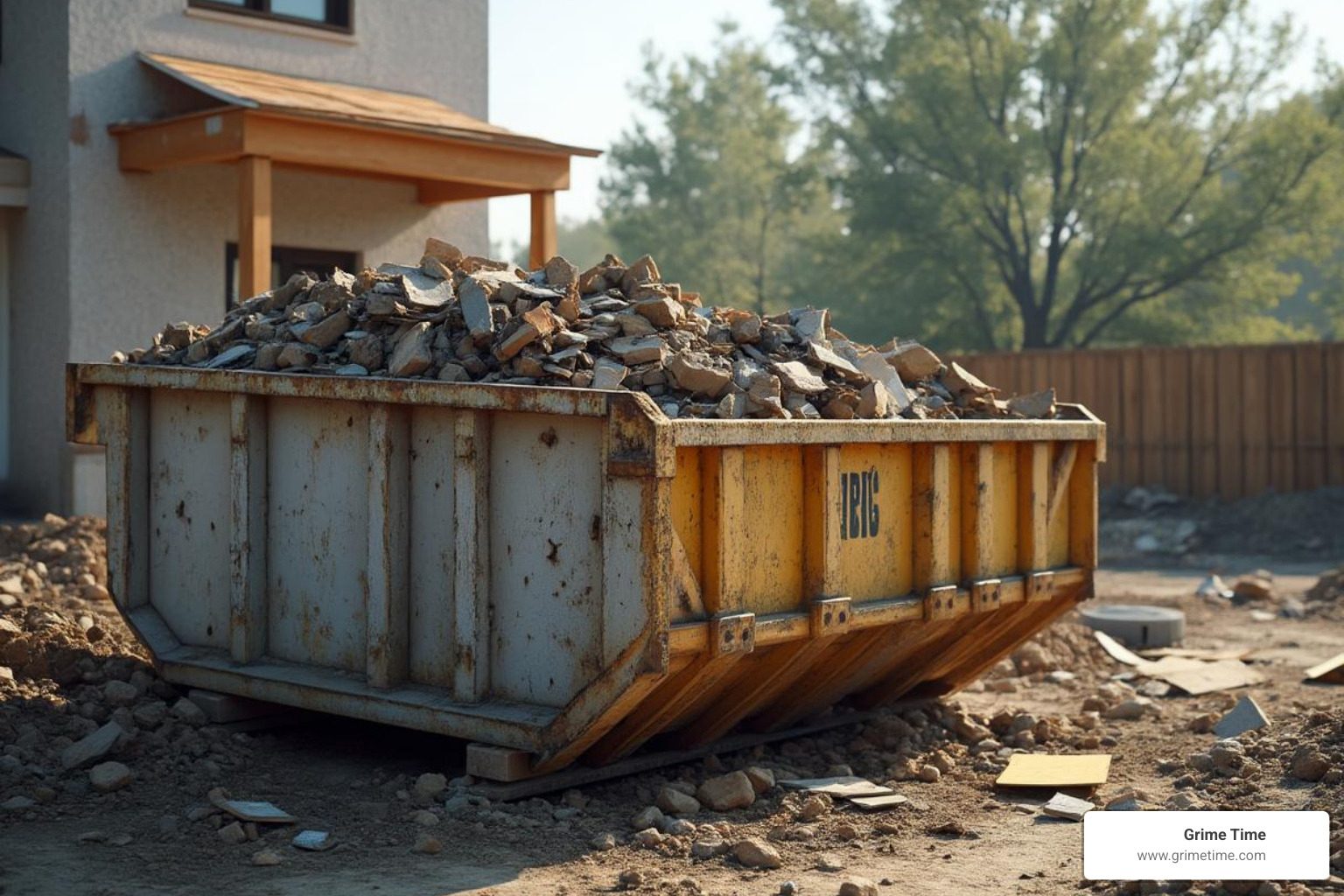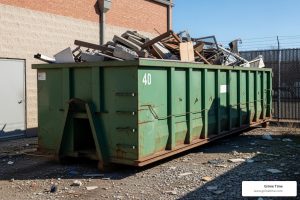Navigating Construction Waste Dumpster Rentals
For any major renovation, demolition, or building project, a construction waste dumpster rental is essential for efficient and safe debris management.
What is a Construction Waste Dumpster Rental?
- Definition: A large, open-top container (a roll-off dumpster) for construction and demolition (C&D) debris.
- Purpose: To collect and haul away heavy materials like concrete, wood, and metal.
- Key Benefits: Streamlines cleanup, improves job site safety, and saves time and money.
Effectively managing the large volume of waste from construction sites is key to keeping projects on track, on budget, and safe. Without a proper system, piled-up debris can cause hazards and delays.
This guide is for busy contractors who need reliable, cost-effective waste solutions. We’ll cut through the confusion to show you how to choose the right dumpster, understand costs, and manage project waste like a pro.
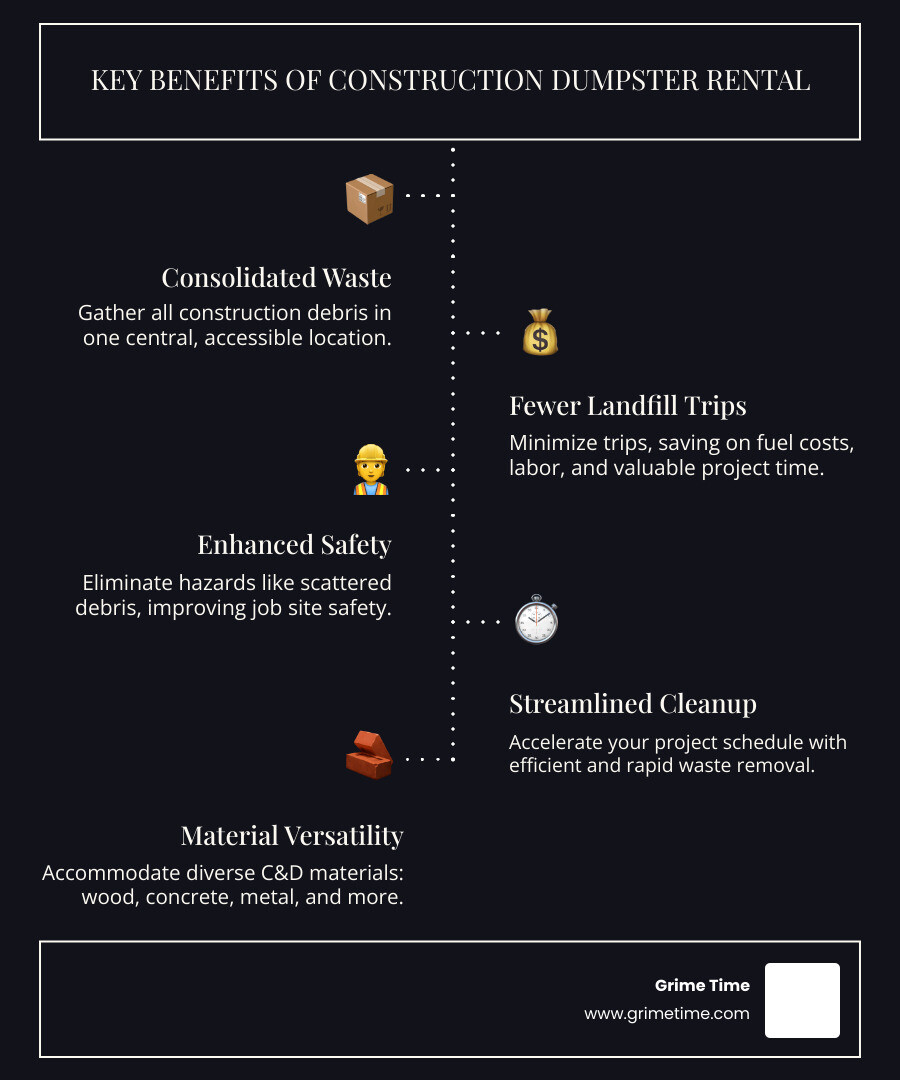
Construction waste dumpster rental vocab explained:
Why Roll-Off Dumpsters are the Go-To for Construction Sites
Smart waste management is the unsung hero of any smooth-running construction project. A construction waste dumpster rental is essential for keeping your job site clean, safe, and efficient. Unlike residential bins, these heavy-duty dumpsters are built to handle bulky debris from any construction, renovation, or demolition project, from a home renovation in Austin to a commercial demolition in Round Rock.
What is a Roll-Off Dumpster?
A roll-off dumpster is a large, open-top container delivered by a specialized truck. Often called construction dumpsters, they are designed to handle heavy C&D debris. Key design features make them highly practical: the open-top allows for easy disposal of bulky items, while many feature walk-in rear doors to simplify loading heavy materials. The rectangular shape maximizes space, and their wheeled design allows our specialized trucks to place them precisely and transport C&D waste safely to the proper disposal facility.
Key Benefits for Your Project
Using a roll-off dumpster makes your project run smoother, boosts safety, and saves money.
- Consolidated waste: A roll-off dumpster provides a central spot for all debris, keeping your site tidy and simplifying cleanup.
- Fewer landfill trips: A single roll-off dumpster holds multiple pickup truck loads, saving you numerous trips, time, and fuel costs, allowing your team to focus on the project.
- Reduced safety hazards: Containing debris in a dumpster reduces tripping hazards and risks from sharp objects, creating a safer work environment for your crew and preventing costly accidents.
- Streamlined cleanup: Debris can be placed directly into the dumpster as it’s created, preventing pile-ups and making daily and final cleanup fast and efficient.
- Versatility for various materials: These dumpsters are built to handle a wide range of C&D materials, including concrete, wood, drywall, and shingles, simplifying your waste management plan.
- Improved job site efficiency: With waste management handled, your crew can focus on construction tasks, leading to faster project completion and improved productivity.
For a deeper dive into how these benefits translate into real-world savings and convenience, we encourage you to explore the Benefits of Renting a Roll-Off Dumpster.
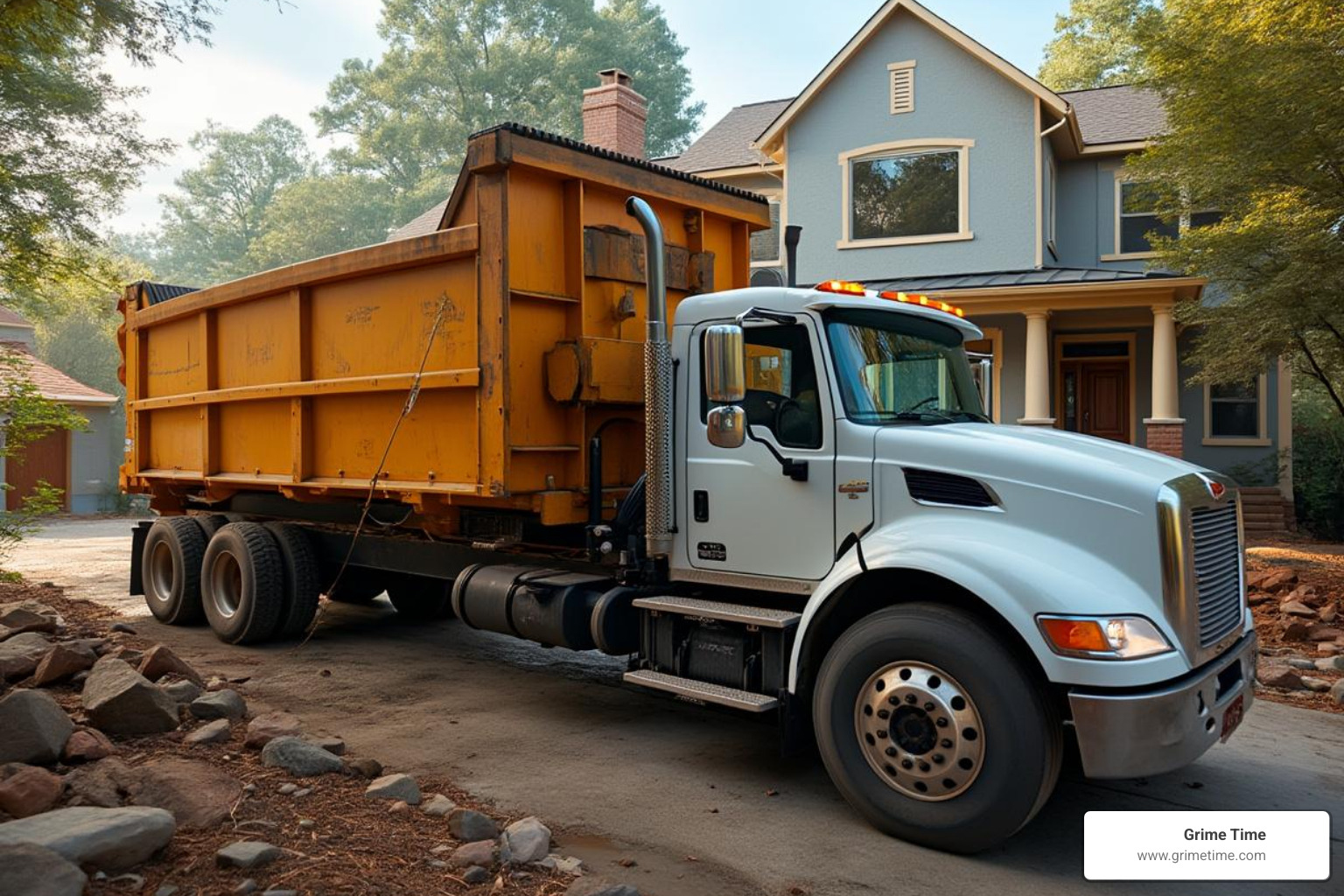
Choosing the Right Size: A Guide to Construction Dumpster Dimensions
Choosing the right dumpster size is crucial for efficiency and cost. Too small, and you’ll face extra costs for more pickups; too large, and you’re paying for unused space.
Dumpster sizes are measured in cubic yards, indicating the volume of material they hold. To help visualize, a standard pickup truck holds about 2-3 cubic yards. Consider your project’s scale and debris volume when choosing.
Small to Medium Projects (10 & 20 Yard)
Ideal for smaller renovations, cleanouts, and specific demolition tasks, these sizes fit well on residential driveways or tight job sites in places like Cedar Park or Kyle.
- 10 Yard Dumpster: Holds 10 cubic yards (approx. 4 pickup truck loads). It’s ideal for small home cleanouts, minor single-room remodels, or disposing of concrete from a small patio. The average rental cost is around $395.
- 20 Yard Dumpster: Our most popular and versatile size, holding 20 cubic yards (approx. 8-10 pickup truck loads). It’s suitable for roofing projects (2,500 – 3,000 sq. ft. single-layer), large room renovations, or medium-sized landscaping jobs. The average cost is around $475.
- For more details on projects suited for these sizes, check out our guide on Dumpsters for Demolition, Home Building, and Remodeling.
Large-Scale Construction & Demolition (30 & 40 Yard)
For major construction, demolition, or large-scale cleanouts, these dumpsters are designed to handle significant debris volumes.
- 30 Yard Dumpster: Holding 30 cubic yards (approx. 10-12 pickup truck loads), this size is excellent for major home additions, commercial roof tear-offs, or demolition of large decks and garages. The average cost is around $575.
- 40 Yard Dumpster: Our largest dumpster holds 40 cubic yards (approx. 20 pickup truck loads). This size is used for large-scale demolition, new home construction, or complete building remodels. The average cost is around $650.
Choosing the right size is key. If you’re unsure, consult with us. We’ll help you estimate your debris volume to find the perfect fit for your project in Austin or any of our Central Texas service areas like Pflugerville or Hutto. Learn more about selecting the ideal size in our comprehensive guide on How to Choose the Right Dumpster Rental Sizes. You can also find more specific information for larger projects on our Construction Roll-Off Dumpster Rental page.
The A-Z of Renting a Construction Waste Dumpster
Our rental process for a construction waste dumpster rental is straightforward, ensuring you get the right dumpster on time so you can focus on your project in Austin, Bastrop, or any of our service locations.
Step 1: Quoting and Booking Your Dumpster
The first step is to clarify your project’s needs to ensure a smooth rental process.
- Assess your project’s scope (e.g., small remodel vs. large build-out) to determine the dumpster size.
- Estimate the debris type. Heavier materials like concrete and asphalt affect total weight and may influence the recommended dumpster size.
- Request a quote for our transparent, all-inclusive pricing.
- Schedule your delivery. We recommend booking in advance to guarantee availability, especially during peak seasons. A 48-hour notice is typically required, though we can often accommodate 24-hour requests.
For more insights on how to prepare for your project’s waste management needs, take a look at our guide on Planning Construction or Home Renovation in Austin.

Step 2: Understanding Permits and Local Regulations
While Texas doesn’t regulate dumpster rentals at the state level, local city and county rules vary. It’s crucial to understand these regulations, especially for placement on public property.
If placing a dumpster on a public street or sidewalk, you will likely need street placement permits from local authorities. For example, Austin has specific rules for public rights-of-way. While we can offer guidance, securing any necessary permits is your responsibility.
If your project is in an HOA community, check their specific Homeowner Association (HOA) rules regarding dumpster placement and duration.
To protect your property, our drivers place wood planks on your driveway before delivery to prevent damage. Please ensure the placement area is stable and clear of obstructions and low-hanging wires for a safe delivery.
Understanding these local nuances is key. For general information on waste disposal guidelines in our state, refer to Texas Waste Disposal Laws. You can also check the Austin city regulations for specific local requirements.
What Goes In? Acceptable vs. Prohibited Materials
Knowing what you can and cannot throw into your construction waste dumpster rental is vital for a smooth disposal process, avoiding extra fees, and ensuring environmental compliance.
Common Materials You CAN Dispose Of
Our roll-off dumpsters accept a wide range of construction and demolition (C&D) debris. Acceptable materials include:
- Wood and lumber: Untreated wood, plywood, framing, and decking.
- Drywall: Gypsum board and plaster.
- Concrete and brick: Broken concrete, bricks, and blocks. We often recommend a smaller dumpster for these heavy materials to avoid exceeding weight limits.
- Asphalt and shingles: Roofing materials.
- Metal scraps: Non-hazardous metals like steel and aluminum.
- Siding: Vinyl, aluminum, or wood siding.
- Carpeting and flooring: Old carpets, tiles, and hardwood.
- General garbage: Non-hazardous furniture, fixtures, and appliances (without Freon).
- Yard waste: Branches, leaves, brush, and clean soil (check weight limits).
For a comprehensive list, please refer to our guide on What Can and Cannot Go in a Dumpster.
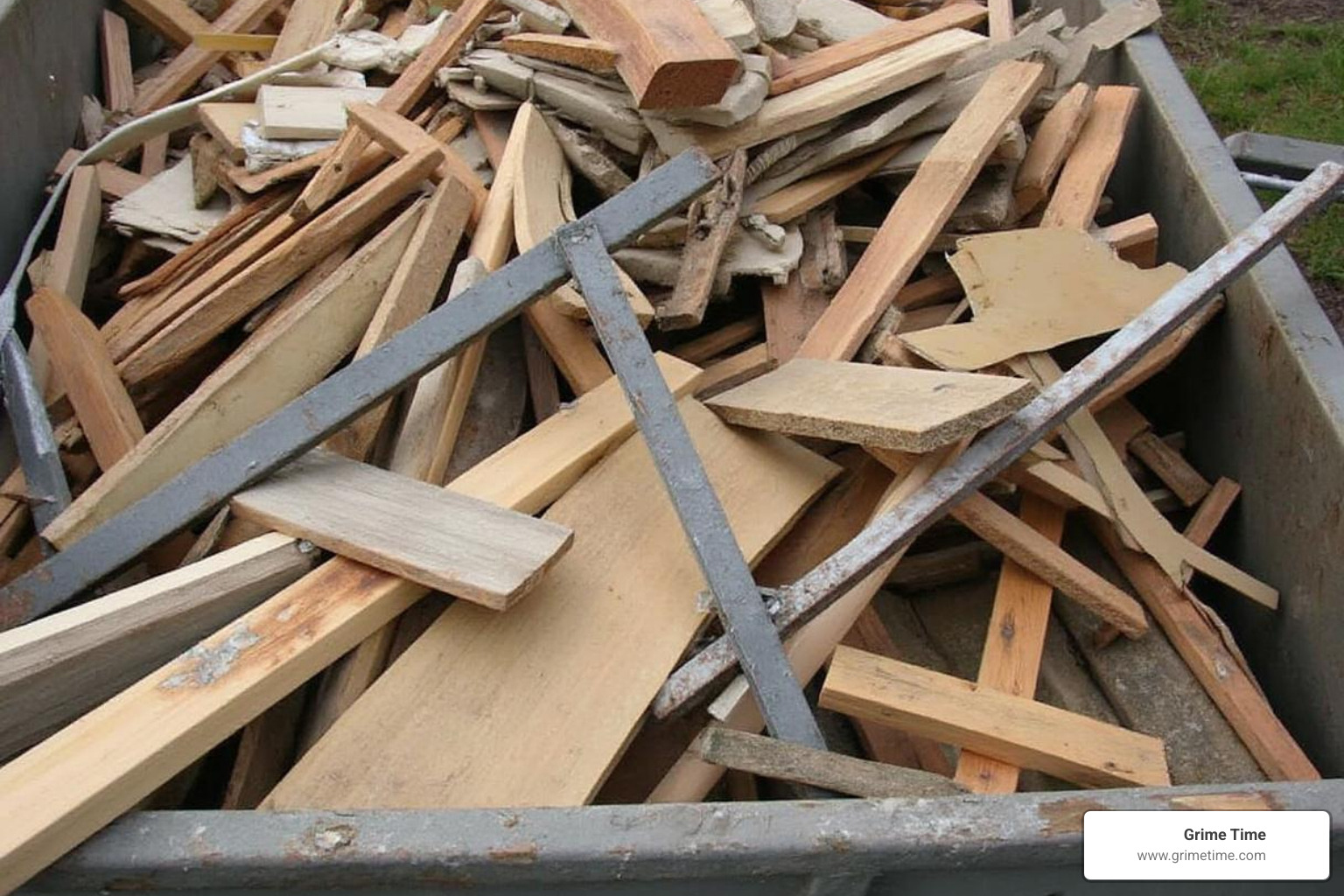
Prohibited Items You CANNOT Dispose Of
Certain items are strictly prohibited due to safety, environmental, or landfill regulations. Improper disposal can lead to fines. Hazardous waste is the primary category of prohibited items and includes anything corrosive, flammable, explosive, or poisonous, such as:
- Asbestos
- Wet paint and solvents
- Batteries (all types)
- Tires
- Freon appliances (refrigerators, AC units)
- Medical waste
- Flammable liquids (gasoline, propane tanks)
These items require special handling. Contact your local hazardous waste disposal center for guidance. We appreciate your cooperation in keeping these materials out of our dumpsters to support our commitment to Eco-Friendly Waste Disposal in Texas.
Decoding the Cost of a Construction Waste Dumpster Rental
Understanding the cost of a construction waste dumpster rental is key for your budget. While the U.S. average is around $450, your final price depends on several factors. We provide transparent pricing with no hidden fees. To provide an accurate quote, we consider several details to fit your project’s specific needs.
Key Factors That Influence Your Final Price
- Dumpster size: This is the biggest cost factor. A 10-yard dumpster might average $395, while a 40-yard could be closer to $650, reflecting the capacity and effort to haul it.
- Rental duration: Our standard period covers a set number of days; extended rentals may incur a small daily charge. We offer flexible timelines to match your project.
- Debris weight: Each rental includes a weight limit (typically 1-4 tons). Exceeding this limit results in overage fees per ton. This is especially relevant for heavy materials like concrete.
- Local landfill fees: Disposal costs vary by landfill and material type. These local rates, which can range from $35 to $100 per ton, are factored into your quote.
- Delivery location: The distance to your job site in areas like Georgetown, Buda, or Elgin may slightly affect the price.
Our goal is to provide a clear, comprehensive price from the start, with all charges spelled out in your quote. For a deeper dive, visit our Roll-Off Dumpster Rental Prices page.
A Note on Contractor Pricing
For contractors managing multiple projects and tight deadlines, we offer special programs designed for efficiency and savings.
- Priority service: We offer faster scheduling for deliveries and pickups to keep your projects on track and avoid costly delays.
- Volume discounts: If you have ongoing projects or need dumpsters frequently, we offer competitive rates for the best value.
- Dedicated support: We provide personalized service to help you evaluate waste streams and find the most cost-effective solutions.
We are committed to being your trusted partner. Ready to see how our custom solutions can give your business an edge? Head over to our Contractor Pricing for Dumpster Rentals page to learn more!
Frequently Asked Questions about Construction Dumpsters
Here are answers to some of the most common questions about construction waste dumpster rental to help you feel prepared.
Will a dumpster rental damage my driveway?
Driveway damage is a common concern. At Grime Time, we take extra precautions to protect your property. Our drivers place wooden planks on your driveway before unloading the dumpster to create a protective cushion. This distributes weight and prevents scratches or cracks. We also ensure the placement area is stable and flat. Feel free to discuss placement with our driver to ensure a safe and convenient drop-off.
How much waste can I put in my construction waste dumpster rental?
This question is important for both safety and cost. Keep two things in mind:
- Weight limits and included tonnage: Each dumpster has a specific weight limit (usually 1-4 tons) included in your quote. Exceeding this limit incurs an overage fee. This is particularly relevant for heavy materials like concrete or dirt. We are transparent about all limits and potential fees.
- Do not overfill: For safety and transport regulations, debris cannot be piled above the dumpster’s top edge. This “level-loading” ensures safe transport. Overfilled dumpsters cannot be legally hauled, which can cause project delays and extra charges. We will inform you of all loading guidelines.
How far in advance should I book my construction waste dumpster rental?
We recommend booking your dumpster as far in advance as possible, though we strive for flexibility. A 48-hour notice is typically required to ensure we have your preferred size available and can schedule a timely delivery. During peak seasons (spring and summer), booking further in advance is crucial to guarantee availability. If you’re in a pinch, we can often provide a 24-hour turnaround, depending on availability. Planning ahead ensures a smoother experience.
Conclusion
Effective waste management is the key to a successful construction project. Whether a small remodel in Lakeway or a large commercial build in Georgetown, the right construction waste dumpster rental is essential. Without it, job sites become hazardous, inefficient, and costly, leading to project delays.
This guide has covered how to choose the right dumpster size, understand costs, and manage your waste plan effectively to keep your project on track. Remember to assess your scope, understand local regulations, know what materials are allowed, and book in advance to save time and money.
At Grime Time, we are a reliable partner for contractors and homeowners across Austin and Central Texas, including Buda, Bastrop, Cedar Park, Elgin, Hutto, Kyle, Lakeway, Round Rock, San Marcos, Georgetown, and Pflugerville. We are committed to transparent pricing with no hidden fees and dependable service.
We value your time and projects, offering a straightforward process and special programs for contractors that include priority service and volume discounts.
Ready to experience the difference that reliable waste management makes? Get Your Round Rock Dumpster Rental Today and let us handle the debris while you focus on what you do best—bringing your vision to life.

